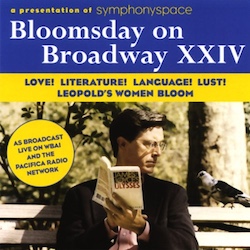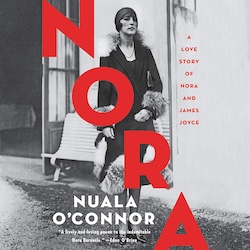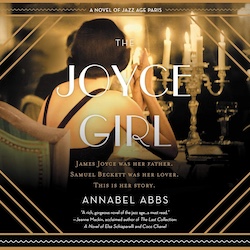Joyce Audio – Audiobooks: Joycean Miscellany
- At October 01, 2022
- By Great Quail
- In Joyce
 0
0
Joyce Audio: Joycean Miscellany
This page collects Joycean miscellany on audio; mainly features about Bloomsday and Joycean novelizations and fiction. Most links take you Amazon, where you may listen to samples and download digital “aax” files for your Audible-enabled device. Other media such as LP, cassette, CD, MP3, and FLAC are listed separately.
Joyce Audio
[Main Page | His Own Voice | Collections | Dubliners | Portrait | Ulysses | Finnegans Wake | Drama & Poetry | Biography & Criticism | Miscellany]
Bloomsday
Bloomsday on Broadway XXIV

Bloomsday on Broadway XXIV
Narrated by Isaiah Sheffer
Symphony Space, 2005
Length: 4 hours, 48 minutes
This recording of the 24th Bloomsday on Broadway was originally broadcast on WBAI and streamed live on 16 June 2005. The evening is genially moderated by Isaiah Scheffer (1935-2012), one of the founders of Symphony Space, with WBAI radio host Larry Josephson (1939-2022) providing comically wry station breaks. Despite appearing on the cover and listed by Audible as “narrator,” Stephen Colbert only appears on two tracks, where he voices Leopold Bloom in staged readings of “Calypso” and “Lotus Eaters.”
As with all Bloomsday on Broadway productions, it’s a long evening filled with readings from Ulysses, snippets of other Joycean works, and musical performances. The theme of this production is “Love! Literature! Language! Lust! Leopold’s Women Bloom.” Molly and Gertie are highlighted, with secondary emphasis on Mina Purefoy and Bella Cohen. The theme is also extended to Finnegans Wake, with the “Anna Livia Plurabelle” episode getting a lovely reading by BOB favorite Marian Seldes. As one might expect whenever a live performance is broadcast on the radio, a few segments are lost in translation—“The Chorus of 34 Mollys” may have been charming on stage, but the audio track is best described as “grating.”
The Ulysses readings are quite entertaining, and the entire cast appears to be enjoying themselves tremendously. Stephen Colbert makes a surprisingly credible Bloom, affecting a light—if inconsistent—Irish accent, and highlighting the humor of the text with his usual awkward charm. It should also be mentioned that the production leans into the notion of Ulysses as being “obscene.” The evening’s promise of “Lust!” is more than fulfilled by Bernadette Quigley’s breathy reading of “Nausicaa” and John O’Callahan’s hilarious, yet strangely tender reading of one of Joyce’s pornographic letters to Nora.
The readings are generously interspersed with musical interludes. Four songs are original compositions: composer and sculptor Raluca Barbulescu sings her “Anna Livia Plurabelle,” and the Finnish trio Kaiku sings three original songs based on Joyce’s poetry: “Flower for My Daughter,” “All Day I Hear the Noise of Waters,” and “Ecce Puer.” Two traditional songs closely associated with Joyce—“Those Seaside Girls” and “The Lass of Aughrim”—are beautifully sung by Lisa Flanagan, daughter of Joycean stalwart Fionnula Flanagan, and herself a frequent producer of Bloomsday on Broadway. Another standout is the Gaelic ballad “Siúil a Rúin,” here performed by Ashley Davis.
The recording quality is generally solid, with a few tracks inexplicably dropping in volume. Unfortunately, the Audible “audiobook” is sold without any documentation, making the numerical chapter headings meaningless—listeners have to simply remember which “chapters” contain material they’d like to repeat. Because of this, I’ve created a simple index that may help listeners better navigate this four-hour production. Because the set offers no written credits, I’ve made “best guesses” about a few name spellings.
Contents:
1. Introduction by Larry Josephson and Isaiah Sheffer (4:00)
2. The Chorus of 34 Mollys (5:26)
3. Reading from “Lestrygonians,” featuring Malachy McCourt (6:21)
4. Reading from “Wandering Rocks” (3:49)
5. Reading from “Sirens” (7:52)
6. Song: “Those Seaside Girls,” sung by Lisa Flanagan (2:29)
7. Reading from “Nausicaa,” featuring Bernadette Quigley as Gertie and Frank Delaney as Bloom (14:59)
8. Song: “Down by the Salley Gardens,” sung by Martha Gunter and Christina Duke (3:02)
9. Reading from “Oxen of the Sun” featuring Sarah Montague, Paul Heck, and Malachy McCourt (11:11)
10. Excerpt from Joyce Letter to Nora (2 September 1909) (3:40)
11. Reading from “Circe,” featuring Barbara Feldon as “Bello” Cohen (10:17)
12. Introduction to Finnegans Wake by Isaiah Sheffer (2:19)
13. Song: “Anna Livia Plurabelle,” composed and sung by Raluca Barbulescu (2:22)
14. Reading from “Anna Livia Plurabelle,” featuring Marian Seldes; followed by 1929 Joyce recording (13:02)
15. Songs: “Flower for My Daughter,” “All Day I Hear the Noise of Waters,” and “Ecce Puer” composed and performed by Finnish trio Kaiku (10:22)
16. Full reading of “Calypso,” narrated by Isaiah Sheffer and featuring Stephen Colbert as Bloom (40:55)
17. Song: “Siúil a Rúin,” sung by Ashley Davis (2:37)
18. Full reading of “Lotus Eaters,” narrated by Isaiah Sheffer and featuring Stephen Colbert as Bloom (44:58)
19. Excerpt from Joyce Letter to Nora (31 August 1909) (2:19)
20. Song: “The Lass of Aughrim,” sung by Kate O’Brien (2:42)
21. Reading from “The Dead,” featuring Fritz Weaver and Rochelle Oliver (16:03)
22. Excerpt from Sylvia Beach letter to James Joyce (12 April 1927) (3:29)
23. Excerpt from three Joyce letters: to Stanislas (9 October 1906), to Nora (3 December 1909), and to Frank Budgen (16 August 1921) (9:20)
24. Song: “Love’s Old Sweet Song,” sung by Lisa Flanagan (2:17)
25. Reading from “Penelope,” featuring Terry Donnelly (1:03:03)
Joycean Fiction
Nora: A Love Story of Nora and James Joyce

Nora: A Love Story of Nora and James Joyce
By Nuala O’Connor
Read by Jenn McGuirk
HarperAudio, 2021
Unabridged; 12 hours, 56 minutes
Jenn McGuirk is an Irish-born filmmaker and voice actress living in L.A. Her reading of Nora is tasteful and measured, sympathetic to O’Connor’s fictionalized Nora and avoiding cringeworthy “crossover” into Molly Bloom.
Publisher’s Description: Dublin, 1904. Nora Joseph Barnacle is a 20-year-old from Galway working as a maid at Finn’s Hotel. She enjoys the liveliness of her adopted city and on June 16—Bloomsday—her life is changed when she meets Dubliner James Joyce, a fateful encounter that turns into a lifelong love. Despite his hesitation to marry, Nora follows Joyce in pursuit of a life beyond Ireland, and they surround themselves with a buoyant group of friends that grows to include Samuel Beckett, Peggy Guggenheim, and Sylvia Beach. But as their life unfolds, Nora finds herself in conflict between their intense desire for each other and the constant anxiety of living in poverty throughout Europe. She desperately wants literary success for Jim, believing in his singular gift and knowing that he thrives on being the toast of the town, and it eventually provides her with a security long lacking in her life and his work. So even when Jim writes, drinks, and gambles his way to literary acclaim, Nora provides unflinching support and inspiration, but at a cost to her own happiness and that of their children. With gorgeous and emotionally resonant prose, Nora is a heartfelt portrayal of love, ambition, and the quiet power of an ordinary woman who was, in fact, extraordinary.
The Joyce Girl

The Joyce Girl
By Annabel Abbs
Read by Leith McPherson
HarperAudio, 2020
Unabridged; 12 hours, 28 minutes
Over the last few years, Lucia Joyce has seen a lot of attention. While this may be overdue, not all of this attention has been academic, and it’s fair to say some aspects of the Lucia “revival” have been more sensational than scholarly. Joyce’s talented, schizophrenic daughter has become a Galatea into which some literary Pygmalions have breathed their views of paternalism, patriarchy, mental illness, Modernism, genius, and of course James Joyce himself. A novelization of Lucia’s life, The Joyce Girl has drawn criticism for its artistic liberties, such as suggestions of incest between Lucia and her father. It also offers paper-thin characterizations of such historical figures as Samuel Beckett and Carl Jung. But no matter what one thinks of this book—and I am not a fan—it’s given a solid reading by Leith McPherson, best known for her work with Peter Jackson and Amazon’s Rings of Power.
Publisher’s Description: The review in the Paris Times in November 1928 is rapturous in its praise of Lucia Joyce’s skill and artistry as a dancer. The family has made their home in Paris—where the latest ideas in art, music, and literature converge. Acolytes regularly visit the Joyce apartment to pay homage to Ireland’s exiled literary genius. Among them is a tall, thin young man named Samuel Beckett—a fellow Irish expat who idolizes Joyce and with whom Lucia becomes romantically involved. Lucia is both gifted and motivated, training tirelessly with some of the finest teachers in the world. Though her father delights in his daughter’s talent, she clashes with her mother, Nora. And as her relationship with Beckett sours, Lucia’s dreams unravel, as does her hope of a life beyond her father’s shadow. With Lucia’s behavior growing increasingly erratic, James Joyce sends her to pioneering psychoanalyst Carl Jung. Here, at last, she will tell her own story—a fascinating, heartbreaking account of thwarted ambition, passionate creativity, and the power of love to both inspire and destroy. The Joyce Girl creates a compelling and moving account of the real-life Joyce Girl, of thwarted ambition and rejection, and of the destructive love of a father.
Joyce Audio
[Main Page | His Own Voice | Collections | Dubliners | Portrait | Ulysses | Finnegans Wake | Drama & Poetry | Biography & Criticism | Miscellany]
Author: Allen B. Ruch
Last Modified: 15 June 2024
Main Joyce Page: The Brazen Head
Contact: quail(at)shipwrecklibrary(dot)com

